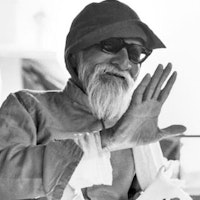To progress, society doesn’t need ‘leaders’ anymore… When we will all see our role in society as servants, we will all light up the sky together like countless stars on a dark night.
To progress, society doesn’t need ‘leaders’ anymore… When we will all see our role in society as servants, we will all light up the sky together like countless stars on a dark night.
Vinoba Bhave

Light up the Sky
Topic: Serving Others
To progress, society doesn’t need ‘leaders’ anymore. This doesn’t mean that we won’t have great men* amidst us. I think great men will come and they will be vital for progress of humanity, but they will be so great that they will refuse to take up this position of leadership… When we will all see our role in society as servants, we will all light up the sky together like countless stars on a dark night. Don’t think of society as the sky on a full moon night. The moon’s harsh light blinds us to the true and humble work of the stars. But on a moonless night, the true servants shine forth, as though they are connected invisibly in this vast and infinite cosmos.
*Vinoba Bhave’s use of the term “great men” reflects the linguistic conventions of his time rather than an exclusion of women.
Vinayak Narahari Bhave, better known as Vinoba Bhave, was born on September 11, 1895, in Maharashtra, India. A stalwart of simplicity and wisdom, Vinoba was profoundly influenced by Mahatma Gandhi, adopting nonviolence and human rights as his life’s pillars. Recognized as Gandhi's spiritual successor and honored with the title Acharya, or teacher, his life demonstrated a steadfast commitment to peace and love as foundational human values.
The essence of Vinoba Bhave's contributions is encapsulated in the Bhoodan Movement, a novel initiative aimed at land redistribution through nonviolent means. This movement showcased his innovative approach to addressing social inequities, deeply rooted in the Gita’s teachings on selflessness. His translation of the Gita into Marathi, 'Geetai', made spiritual wisdom accessible, reflecting his belief in service and community welfare as paramount.
Vinoba Bhave's passing on November 15, 1982, mirrored the principles he lived by. After a heart attack, he chose to leave life on his terms, ceasing to eat and thus peacefully transitioning. This deliberate act underscored his teachings on life's natural cycles and the serenity in accepting impermanence. Vinoba’s life, imbued with humility and the pursuit of justice, continues to inspire a vision of a world where love and compassion prevail.
[Photo Credit: Vinoba Bhave, 1978. Photo by Mark Shepard.]
Shepard, Mark. Gandhi Today: A Report on Mahatma Gandhi’s Successors. Simple Productions, 1987. Reprinted by Seven Locks Press, 1987.

Vinoba Bhave
Theme: Serving

About This Vinoba Bave Quotation [Commentary]
Vinoba Bhave offers a clear reorientation of how society might move forward: “To progress, society doesn’t need ‘leaders’ anymore.” This is not a rejection of those with vision and strength. Bhave acknowledges that “great men will come and they will be vital for progress of humanity,” but emphasizes that their greatness will be marked by humility. “They will be so great that they will refuse to take up this position of leadership.” In refusing leadership, they make space for a different kind of influence—one rooted in service rather than control.
This shift is captured in Bhave’s image of the night sky. “When we will all see our role in society as servants, we will all light up the sky together like countless stars on a dark night.” Each person contributes, not by rising above, but by stepping into a shared responsibility. Bhave warns against seeing society “as the sky on a full moon night,” where the “moon’s harsh light blinds us to the true and humble work of the stars.” When one central figure dominates, the quieter work of many is hidden. But in darkness—when there is no moon—each star becomes visible, and the shared light of service reveals a different kind of radiance.
Bhave’s reflection on service redefines the path of social progress. Rather than depending on the few, he calls for a society in which all participate as “true servants.” This is not a passive role; it is a conscious choice to contribute without seeking recognition. In this way, people “shine forth, as though they are connected invisibly in this vast and infinite cosmos.” His vision does not erase individuality but honors the collective dignity of those who serve.
Gender Balance in Vinoba Bhave’s “A Servant Leader”
In Vinoba Bhave’s “A Servant Leader,” his use of the term “men” reflects the linguistic conventions of his time rather than an exclusion of women. Writing in English—his non-native language—Bhave followed the then-common practice of using “men” as a general term for all people. In Indian languages, such as his native Marathi, terms like manushya—meaning human—carry a broader and more inclusive meaning. Bhave’s teachings consistently advocate for women’s empowerment and recognize their vital role in societal transformation. When he speaks of “great men,” he refers to great individuals, inclusive of all genders. For Bhave, every person, regardless of gender, has the potential to contribute their unique light to the collective progress of society, illuminating the shared path toward a more just and compassionate world.
Resources
Related Quotes
Copyright © 2017 – 2026 LuminaryQuotes.com About Us